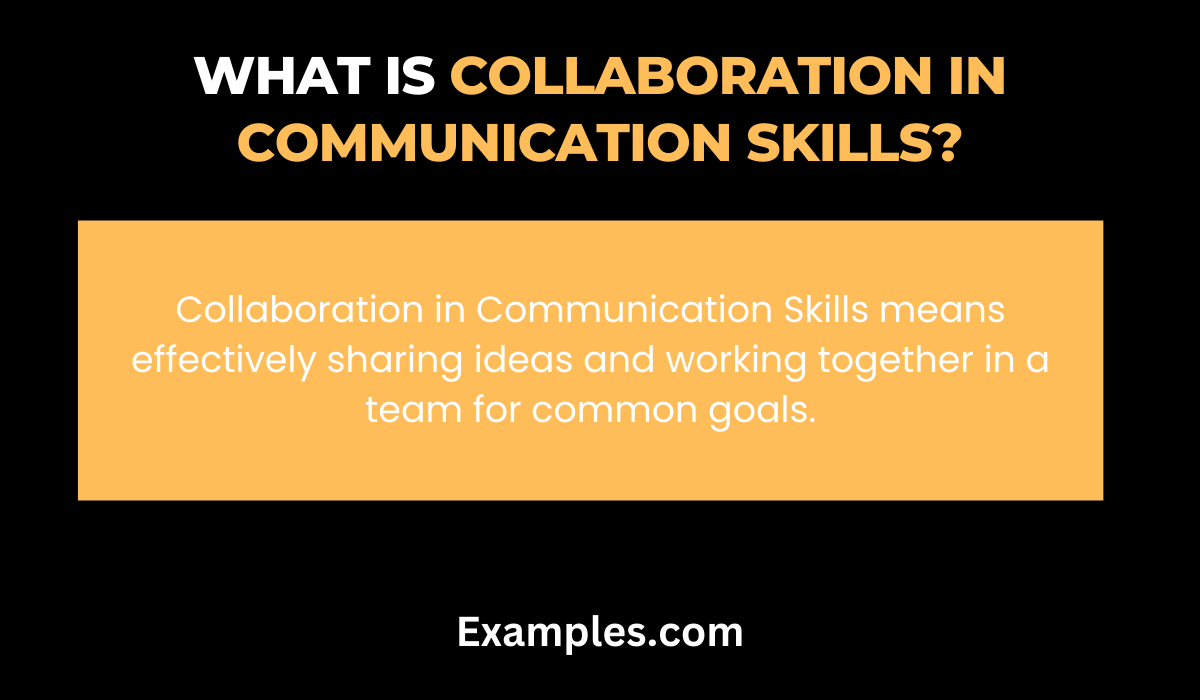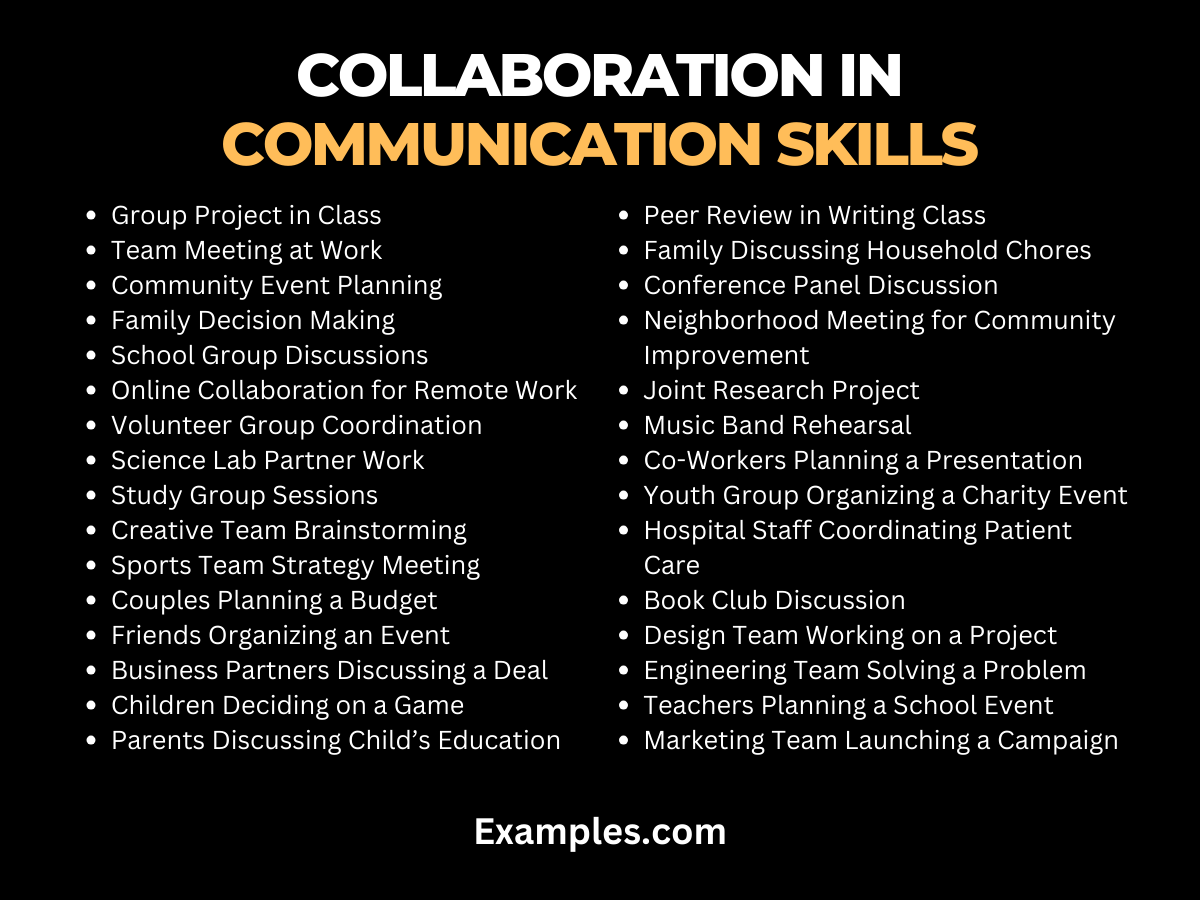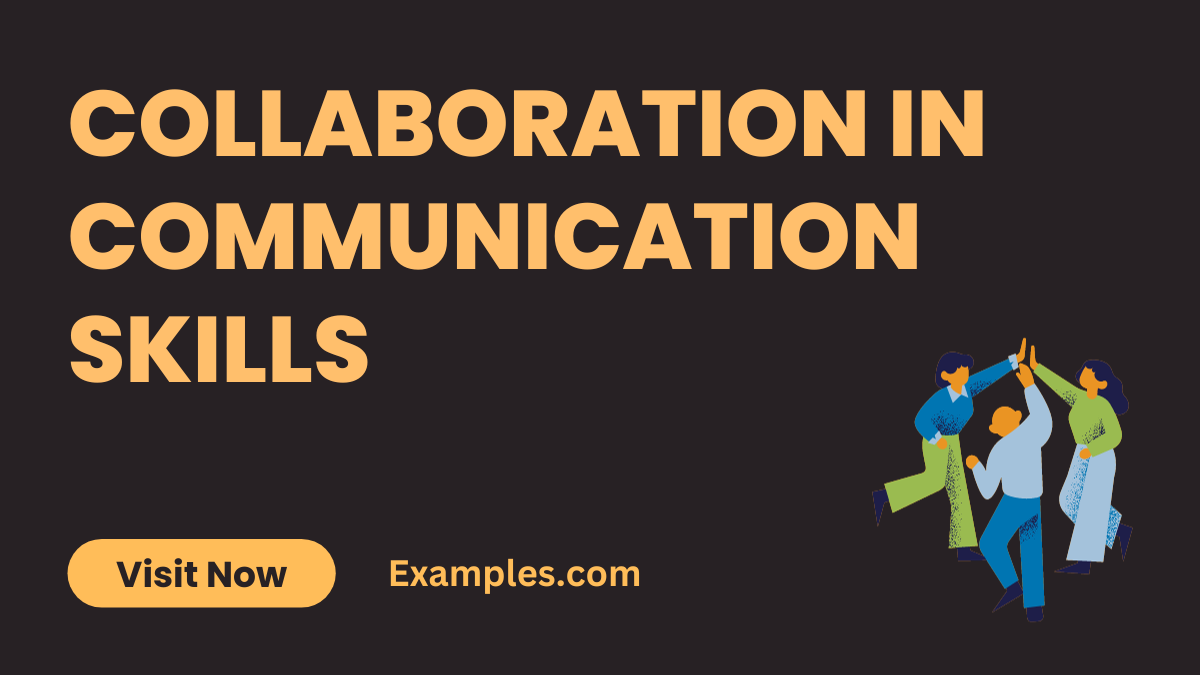29+ Collaboration in Communication Skills Examples
In the realm of teamwork and group dynamics, mastering Collaboration in Communication Skills is key. This complete guide, enriched with practical Communication Examples, will take you through the nuances of how effective communication fosters collaboration. From the importance of empathy and active listening to the effective use of feedback, discover how these skills can transform the way teams interact and achieve their goals.
What is Collaboration in Communication Skills?
Collaboration in Communication Skills refers to the ability to effectively exchange ideas, share resources, and work together towards common goals within a team or group setting. It combines aspects of empathy, active listening, and clear articulation, allowing for a cohesive and productive team environment.

What is the Best Examples of Collaboration in Communication Skills?
A prime example of collaboration in communication skills is a cross-functional team working together on a project. Each member brings unique expertise, and through open communication, they share ideas, provide constructive feedback, and work cohesively towards a successful outcome.

30 Collaboration in Communication Skills
Collaboration is a cornerstone of effective communication. It involves working jointly with others to achieve common goals. Effective collaboration requires clear and open communication, where each member feels valued and heard. This skill is essential in diverse settings, from academic environments to professional workplaces. Developing strong communication skills for collaboration fosters a harmonious and productive team dynamic, leading to successful outcomes.

- Group Project in Class: While working on a group project, a student says,
“Let’s each share our ideas, and then we can decide together which one works best for our project.” - Team Meeting at Work: During a team meeting, a manager suggests,
“I think we should go around the table and get everyone’s input on this issue.”

- Community Event Planning: A community leader states,
“Everyone’s perspective is important. Let’s create a space where we can all contribute our thoughts freely.” - Family Decision Making: In a family discussion about a vacation, one member says,
“How about we all list our top three destinations and find the common ones?” - School Group Discussions: A student proposes,
“To understand this topic better, let’s break into small groups and discuss, then share our findings with the class.” - Online Collaboration for Remote Work: In a virtual meeting, a team member suggests,
“Can we use a shared document to compile our ideas asynchronously before our next meeting?” - Volunteer Group Coordination: A volunteer coordinator says,
“Each of us has unique skills; let’s assign roles based on our strengths to make this event successful.” - Science Lab Partner Work: A lab partner remarks,
“I’ll handle the data collection, and you can do the analysis. This way, we can divide the workload effectively.” - Study Group Sessions: A member of a study group offers,
“Let’s each teach a section of the material; it will help us all understand the content better.” - Creative Team Brainstorming: In a brainstorming session, a team member says,
“Every idea is valuable. Let’s put all our thoughts on the board and see which ones spark more creativity.” - Sports Team Strategy Meeting: A coach advises,
“Let’s discuss our strategies openly to ensure we all understand and agree on our game plan.” - Couples Planning a Budget: One partner suggests,
“If we both share our financial goals and concerns, we can create a budget that works for both of us.” - Friends Organizing an Event: A friend proposes,
“Let’s divide the tasks based on what each of us enjoys doing. That way, organizing this event will be fun and efficient.” - Business Partners Discussing a Deal: During a negotiation, one partner says,
“Let’s outline our priorities to find a win-win solution for both companies.” - Children Deciding on a Game: A child in a group of friends states,
“Why don’t we each suggest a game and then vote on which one to play?” - Peer Review in Writing Class: A student comments,
“Your feedback on my draft is valuable. Let’s review each other’s work to improve our writing skills.” - Family Discussing Household Chores: A parent says,
“If we each choose chores we’re good at, managing the household will be much easier.” - Conference Panel Discussion: A panelist suggests,
“Each of us brings a unique perspective. Let’s build on each other’s points to provide a comprehensive view to the audience.” - Neighborhood Meeting for Community Improvement: A resident offers,
“Let’s collaborate to identify the most pressing issues in our neighborhood and work together to find solutions.” - Joint Research Project: Researchers decide,
“Let’s split the research areas based on our expertise to cover more ground efficiently.” - Music Band Rehearsal: A band member says,
“Let’s each play our part separately first, then combine them to see how they sound together.” - Co-Workers Planning a Presentation: One co-worker proposes,
“If we each take a section of the presentation, we can bring diverse perspectives to the topic.”

- Youth Group Organizing a Charity Event: A youth leader states,
“Everyone has great ideas. Let’s make sure we hear from each person.” - Hospital Staff Coordinating Patient Care: A nurse suggests,
“Let’s have a quick huddle every morning to discuss our patients’ needs and coordinate care.” - Book Club Discussion: A member of the book club says,
“To understand the book better, let’s each talk about our favorite character and why.” - Design Team Working on a Project: A designer proposes,
“Let’s merge our individual designs to create a unique and collaborative final product.” - Engineering Team Solving a Problem: An engineer suggests,
“If we brainstorm solutions together, we might come up with a more innovative approach.” - Teachers Planning a School Event: One teacher remarks,
“We should combine our ideas to make this event enjoyable and educational for the students.” - Marketing Team Launching a Campaign: A team member says,
“Let’s align our individual tasks with the overall strategy to ensure a cohesive campaign.” - Parents Discussing Child’s Education: A parent proposes,
“Let’s discuss our child’s strengths and challenges to make informed decisions about their education.”
What is the Role of Collaboration in Communication Skills
Collaboration plays a pivotal role in enhancing communication skills by fostering a cooperative environment where ideas and information are freely exchanged. It is the foundation of effective team dynamics, crucial in both personal and professional contexts. Understanding the role of collaboration in communication is essential for successful interaction and relationship building.
- Encourages Open Dialogue: Collaboration creates an atmosphere where everyone feels comfortable sharing ideas, leading to richer conversations and more creative solutions.
- Enhances Problem-Solving Skills: Through collaborative communication, individuals combine their strengths and expertise to tackle challenges more effectively.
- Builds Trust and Respect: Regular collaboration through effective communication fosters trust among team members, enhancing overall group cohesion.
- Promotes Diverse Perspectives: Collaboration in communication encourages the sharing of different viewpoints, leading to a more well-rounded understanding of issues.
- Improves Listening Skills: Effective collaboration requires active listening, a key component of strong communication skills.
- Fosters Learning and Growth: Collaborative environments are ideal for learning from others, acquiring new skills, and personal development.
- Increases Engagement and Motivation: When team members collaborate, they feel more invested and motivated, improving the overall team performance.
- Supports Conflict Resolution: Collaboration in communication provides a platform for resolving misunderstandings and conflicts in a constructive manner.
- Enhances Decision-Making: Collaborative communication leads to more informed and considered decisions, as multiple perspectives are taken into account.
- Builds Stronger Relationships: Collaboration strengthens interpersonal relationships through regular, meaningful interaction and shared goals.
Importance of Collaboration in Communication Skills
The importance of collaboration in communication skills cannot be overstated. It is vital for achieving synergy in group settings, ensuring that collective efforts are more effective than individual ones. Recognizing the importance of collaboration is key to harnessing its power in various communication contexts.
- Key to Team Success: Effective collaboration is often the differentiator between successful and struggling teams.
- Facilitates Innovation: Collaborative communication is a breeding ground for innovative ideas and creative problem-solving.
- Essential for Leadership: Leaders with strong collaboration skills are better equipped to manage teams and inspire collective action.
- Improves Organizational Efficiency: In a workplace, collaboration improves processes and workflow, leading to higher productivity.
- Crucial for Learning Environments: In educational settings, collaboration enhances learning experiences and outcomes.
- Promotes Cultural Exchange: Collaboration in diverse teams fosters cross-cultural understanding and respect.
- Supports Personal Development: Engaging in collaborative communication helps individuals develop empathy and social skills.
- Improves Crisis Management: In times of crisis, effective collaboration is essential for quick and efficient resolution.
- Strengthens Community Ties: Community projects benefit greatly from collaborative communication efforts.
- Necessary for Global Connectivity: In an increasingly interconnected world, collaboration skills are essential for global cooperation and progress.
Benefits of Collaboration in Communication Skills
Collaboration is not just about completing tasks together; it’s a vital component of effective communication skills. By collaborating, individuals can combine their strengths, knowledge, and perspectives, leading to more innovative solutions and better decision-making. This approach is particularly beneficial in complex environments where diverse viewpoints are needed to address challenges.
- Enhanced Problem-Solving: Collaborative communication brings multiple perspectives to the table, resulting in more creative and effective problem-solving strategies.
- Increased Learning Opportunities: Working with others allows individuals to learn from different viewpoints, enhancing their own communication skills.
- Improved Relationships: Regular collaboration fosters trust and understanding among team members, leading to stronger professional and personal relationships.
- Greater Efficiency: By dividing tasks and leveraging individual strengths, collaborative efforts often lead to more efficient outcomes.
- Enhanced Creativity: Diverse ideas and opinions in a collaborative setting can spark innovation and creative thinking.
- Better Decision Making: When multiple viewpoints are considered, the decisions made are often more comprehensive and well-rounded.
- Increased Engagement and Morale: Participating in a collaborative effort can boost morale and engagement among team members.
- Conflict Resolution: Collaboration in communication skills is key to resolving conflicts amicably and constructively.
- Shared Goals and Objectives: Collaboration aligns individual efforts with shared goals, ensuring everyone works towards the same objectives.
- Adaptability and Flexibility: Working collaboratively develops adaptability and flexibility, crucial traits in today’s dynamic work environment.
Tips for Collaboration in Communication Skills
Effective collaboration requires more than just bringing people together; it necessitates honing communication skills that facilitate harmonious and productive teamwork. Whether in a professional or personal context, these tips can help enhance collaboration through better communication.
- Active Listening: Encourage team members to actively listen to each other, fostering a deeper understanding and respect for different viewpoints.
- Clear Communication: Ensure that messages are conveyed clearly and concisely to avoid misunderstandings.
- Respect for Diversity: Embrace and respect diverse opinions and backgrounds to enrich the collaborative process.
- Openness to Feedback: Constructive feedback should be both given and received openly to improve collective performance.
- Defined Roles and Responsibilities: Clearly define each member’s role to prevent confusion and overlap.
- Trust Building: Develop trust among team members through consistent and honest communication.
- Encouragement of Idea Sharing: Create an environment where all members feel comfortable sharing their ideas.
- Conflict Management: Learn to manage conflicts constructively without derailing the collaborative process.
- Regular Check-ins: Regular meetings or check-ins can help keep everyone aligned and on track.
- Use of Collaborative Tools: Utilize technology and tools designed to facilitate collaborative communication, especially in remote or virtual settings.
Collaboration in communication skills is a dynamic process that enhances team efficiency, creativity, and decision-making. By embracing collaborative communication, teams can achieve greater success and foster a more inclusive and innovative environment. This guide offers practical tips to enhance collaboration skills, crucial for personal and professional growth.



